Special Report
The 30 US Cities With the Most Underrated Food Scenes

Published:
Last Updated:

What makes a good food city? An abundance of good restaurants, of course, ideally offering an ample choice of both casual and serious options and representing a wide range of cuisines. (Food halls and food trucks count.) Sometimes having depth in just one kind of food can be a helpful, too, as El Paso does with its wealth of Mexican places or New Haven with its world-class pizzerias.
There’s more to it than just a roster of good eating places, though. A first-rate food city needs a support system, a dining and cooking public that appreciates not only the way foods taste but their authenticity, their personality, their local identity. A first-rate food city has a population of food-lovers who are proud of the choices available to them and who appreciate tradition — though they should also be open to innovation and to new taste experiences from traditions other than their own.
Farmers markets and good grocery stores and other food shops are important, too, as are providers of peripheral pleasures like coffee shops, wine and spirits stores, bakeries, and ice cream parlors. Craft breweries add a lot to the mix, too, and proximity to farmland, fishing ports, and/or wineries is always a plus.
Most publications and critics (amateur and professional) who rate America’s food cities include the same few regulars in their top ranks, though the order often changes: New York, Chicago, Los Angeles, San Francisco, New Orleans, Portland (Oregon), Houston, and the likes. These are the stars, and not coincidentally, they are also the cities that are often home to many of the best restaurants in America.
Some cities with vibrant food scenes get forgotten for various reasons. Maybe they’re geographically out of the way, like Grand Traverse, Michigan, or Asheville, North Carolina. Sometimes they have gritty past reputations that don’t immediately suggest an appreciation of the culinary arts, like Pittsburgh or Detroit. Or it might be that they’re overshadowed by nearby cities with more established food reputations, like Phoenix by Scottsdale or Memphis by Nashville.
Sometimes, too, good food towns are just so small that people might not think of them as having any gastronomic depth — like Healdsburg, California, or Stonington, Connecticut. Small towns don’t always get the respect they deserve. Here, though, for reasons that may or may not have to do with food and drink, are 40 charming small towns to visit this fall.
Click here to see the 30 best underrated U.S. food cities.
24/7 Tempo referred to local, regional, and national online restaurant rankings, researched farmers markets and other food purveyors, and read menus and reviews to compile a list of cities that should be much better known than they are for their food scenes. Any one of them would make a worthwhile destination for food-lovers who want to expand their experience of America’s great culinary bounty.
Asheville, North Carolina
Nestled in the Blue Ridge Mountains in western North Carolina, Asheville is known as a cultural center — a glittering new art museum opens this month and the River Arts District is home to studios hosting hundreds of artists and craftspeople.
The city has a vibrant food scene as well. Katie Button, who once worked at Spain’s legendary elBulli, runs an acclaimed tapas bar here, Cúrate, as well as a first-rate bagel shop. Gan Shan Station and Gan Shan West serve pan-Asian cuisine. It’s Buxton Hall for barbecue using pasture-raised hogs and Rhubarb for internationally accented Southern comfort food. Add to the mix scores of food trucks, more than 50 craft breweries, and locally grown chardonnay and cabernet from the nearby Biltmore Winery, and you’ve got a gastronomic paradise.
[in-text-ad]
Birmingham, Alabama
This Alabama city’s best-known chef, Frank Stitt, helped invent contemporary Southern cuisine at his seminal Highlands Bar & Grill, which opened in 1982. Winning the 2018 James Beard Outstanding Restaurant Award, it’s still going strong — as are Stitt’s other places, Chez Fonfon, Bottega, and Bottega Café. Other modern Southern choices include Hot and Hot Fish Club and FoodBar. And while there are more modern options, it’s worth noting that the city has had a lively Greek (and Greek-owned barbecue) restaurant scene for more than a century.
Boise, Idaho
Boise has the largest population of Basques outside Spain — an estimated 10,000 of them — and the city has long been known for its tapas bars and fixed-price Basque dinner houses serving more-than-ample multicourse meals.
There’s much more to Boise than that for restaurant-goers, though, with places like Chandlers steak and seafood (and live jazz) emporium; Richard’s, with its locally sourced international bistro food; the eco-conscious pub and beer bar Bittercreek Alehouse; and the nation’s first restaurant distillery, Bardenay, for northwestern fare and housemade gin, vodka, and more. And Idaho’s burgeoning wine country — there are now more than 50 producers — starts just west of the city.

Boulder, Colorado
Denver is known for its craft beer scene, and it has been dubbed one of the country’s hottest food cities, but its near-neighbor Boulder deserves much more attention for its own culinary charms than it is usually afforded. The best-known restaurant here, Frasca Food and Wine, is widely considered to be one of America’s top Italian restaurants. The craft food movement is well represented here too by places like Blackbelly Market with its next-door butcher shop; Black Cat, whose chef raises animals and grows vegetables on his own 130-acre farm; and Cured, a shop with a good selection of small-producer cheeses and charcuterie (and a popular lunch menu).
Jax Fish House & Oyster Bar proves that a restaurant doesn’t have to be within a few miles of the sea to serve perfectly fresh fish and shellfish. Asian cuisines are represented by places like Zoe Ma Ma (Chinese), Chez Thuy (Vietnamese), and Izakaya Amu (Japanese). Also, the dazzlingly ornate Dushanbe Teahouse, which originally stood in Tajikistan and was shipped over and reassembled here, serves not only tea but also an international menu that references Peru, Brazil, India, Iran, Indonesia, and other countries (including, yes, Tajikistan).
[in-text-ad-2]
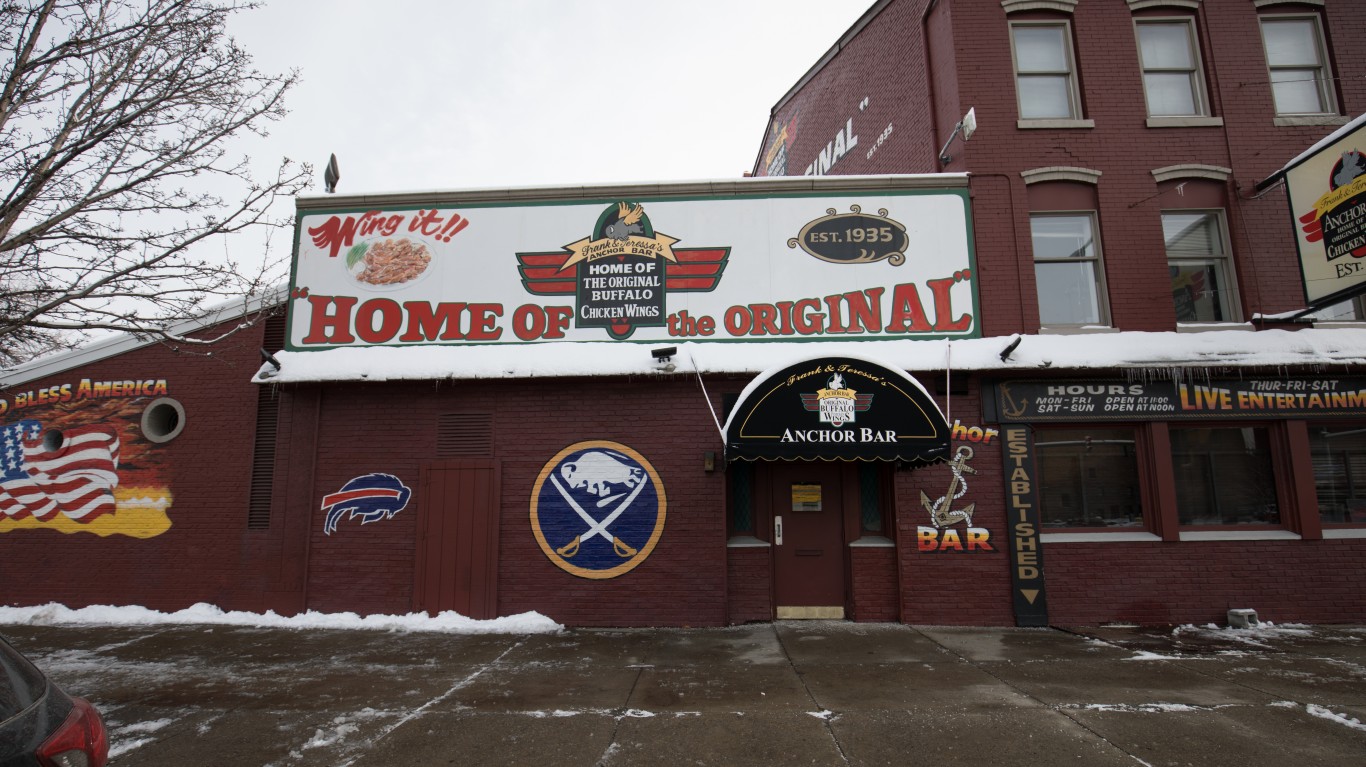
Buffalo, New York
This far northern New York state metropolis is famous worldwide for one dish: Buffalo chicken wings, almost certainly invented by (and still served in abundance at) the city’s Anchor Bar in 1964.
There’s a lot more to the local food scene than that, though. It has a signature sandwich, beef on weck (thin-sliced roast beef on a caraway-seeded kaiser roll), and pizza specialist Arthur Bovino — who wrote a whole book about eating in Buffalo — has predicted that it could become the pizza capital of America. But there are also places like the contemporary Mexican Las Puertas, the stylish vegan café Root & Bloom, and the traditional Southern restaurant Toutant — not to mention the mini-food halls like Expo Market and PK Eats.
Burlington, Vermont
Vermont is famous for its cheeses, its seasonal produce, its craft brewers and cider makers, and its dairy products (including ice cream, of course). Burlington showcases all of these, at its extensive indoor winter and outdoor summer farmers markets and elsewhere, but also it has a thriving restaurant community.
Choices range from the celebrated American Flatbread (“all natural pizza baked in a primitive wood-fired earthen oven”) to the casual neighborhood bistro Butch & Babe’s to the old-line French place Leunig’s. Foam Brewers and other craft breweries, the “coffee tasting bar” Onyx Tonics, and the 20-hour-a-day Kountry Kart Deli with its famous sandwiches and varied breakfast menu add to the food scene options. And from May through August annually, there’s a Truck Stop Block Party featuring food trucks and entertainment.
[in-text-ad]
Charlottesville, Virginia
Charlottesville can date its history as a food city back to Thomas Jefferson’s day. Once described as “our only epicurean President,” Jefferson oversaw a garden at his Monticello estate in the city growing some 330 varieties of vegetables and 170 of fruit. He is also said to have introduced Colonial era diners to French fries, gumbo, fried eggplant, mashed potatoes, and even possibly pumpkin pie.
Today, his garden thrives, and wine is made on land where he first planted European grapes. There are 35 wineries in the area, one of them the site of the elegant Italian restaurant Palladio. There are also French specialties at Fleurie, Asian-inspired tapas at Bang!, all-American sandwiches and other fare at The Virginian (the city’s oldest restaurant), fried chicken and bbq ribs at Ace Biscuit & Barbecue⦠and the list goes on.
Cincinnati, Ohio
Cincinnati-style chili over spaghetti at one of the city’s numerous Skyline or Gold Star franchises; the fried pork-and-oatmeal mush called goetta (much better than it sounds) at Glier’s, Queen City Sausage, or Eckerlin Meats; super-rich Graeter’s ice cream at one of the company’s many local shops; addictive ribs at Montgomery Inn — these are just a few of the must-try foods in this almost-Southern city (Kentucky is just across the river).
For food shopping, the 167-year-old open-air Findlay Market is a must, as is one of two theme-park-like Jungle Jim’s International Market locations, with a combined area of more than 500,000 square feet full of hundreds of thousands of foodstuffs from the world around. Tortillerías, noodle parlors, steakhouses, and the luxurious Restaurant L are among the city’s other culinary attractions.
Cleveland, Ohio
There are two big names in the Cleveland restaurant world, both natives of the city. The first is TV personality (“Iron Chef,” “The Chew”) and chef Michael Symon, whose establishments include Lola, Mabel’s BBQ, Roast, Bar Symon, and B Spot Burgers. The other is Zack Bruell, proprietor of Table 45, L’Albatros, Parallax, Chinato, Cowell & Hubbard, Dynomite Burgers, Exploration, and Alley Cat.
You could stop right there and have more than enough to cement Cleveland’s place in the food-town firmament. Add in recent entries — such as Good Company for pub food, Asiatown’s buzzy LJ Shanghai, a branch of star Florida chef Michael Schwartz’s Michael’s Genuine Food & Drink, the wine bar Flight Cleveland, James Beard Best New Restaurant nominee Larder Delicatessen and Bakery, and food halls like Ohio City Gallery and Van Aken Market Hall — and the city could keep gastronomes busy for weeks.
[in-text-ad-2]
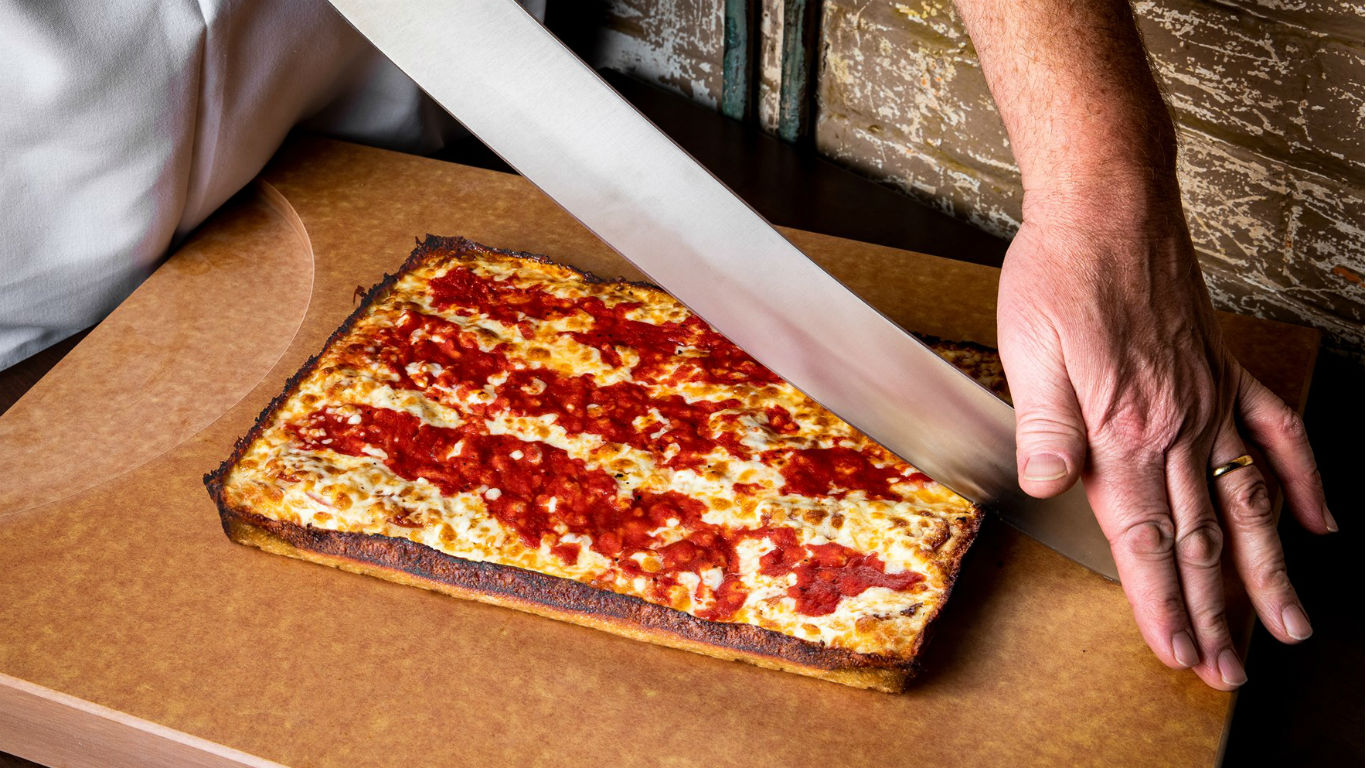
Detroit, Michigan
Whether or not Detroit is “America’s most underrated food city” as Food 52 proposed last year, the food website certainly has plenty of reasons to keep it in the running. Among the places Food 52 hails are Buddy’s for Detroit-style pizza, Cedar Garden for kibbeh nayyeh (Lebanese lamb tartare), Mexicantown’s Honey Bee La Colmena for tamales, and Lafayette Coney Island for coney dogs and chili fries.
There’s so much more, however, including Norma G.’s for Trinadadian fare, Capers for cocktails and steak-by-the-ounce, Voyager for oysters and other seafood, the meat-centric Marrow (one of Eater’s Best New Restaurants for 2019), Bangkok 96 Street Food for Thai specialties, imaginative New American place Selden Standard, and much more.
Durham, North Carolina
The first thing any food-lover should know about Durham is that this former tobacco capital in North Carolina’s Research Triangle has a substantial Mexican population and dozens of taquerías and Mexican restaurants. But the restaurant choices range far beyond that.
There’s the roadside Saltbox Seafood Joint, the Spanish/Southern tapas bar Mateo, the sophisticated kaiseki restaurant Yamazushi (where the chef also makes the pottery serving vessels), the whole-hog barbecue specialist The Pit, the Southern classic Dame’s Chicken & Waffles, James Beard Best Chef winner Andrea Reusing’s sleek modern-American hotel restaurant The Durham, and many more. No wonder Bon Appétit described Durham as “America’s Foodiest Small Town.”
[in-text-ad]
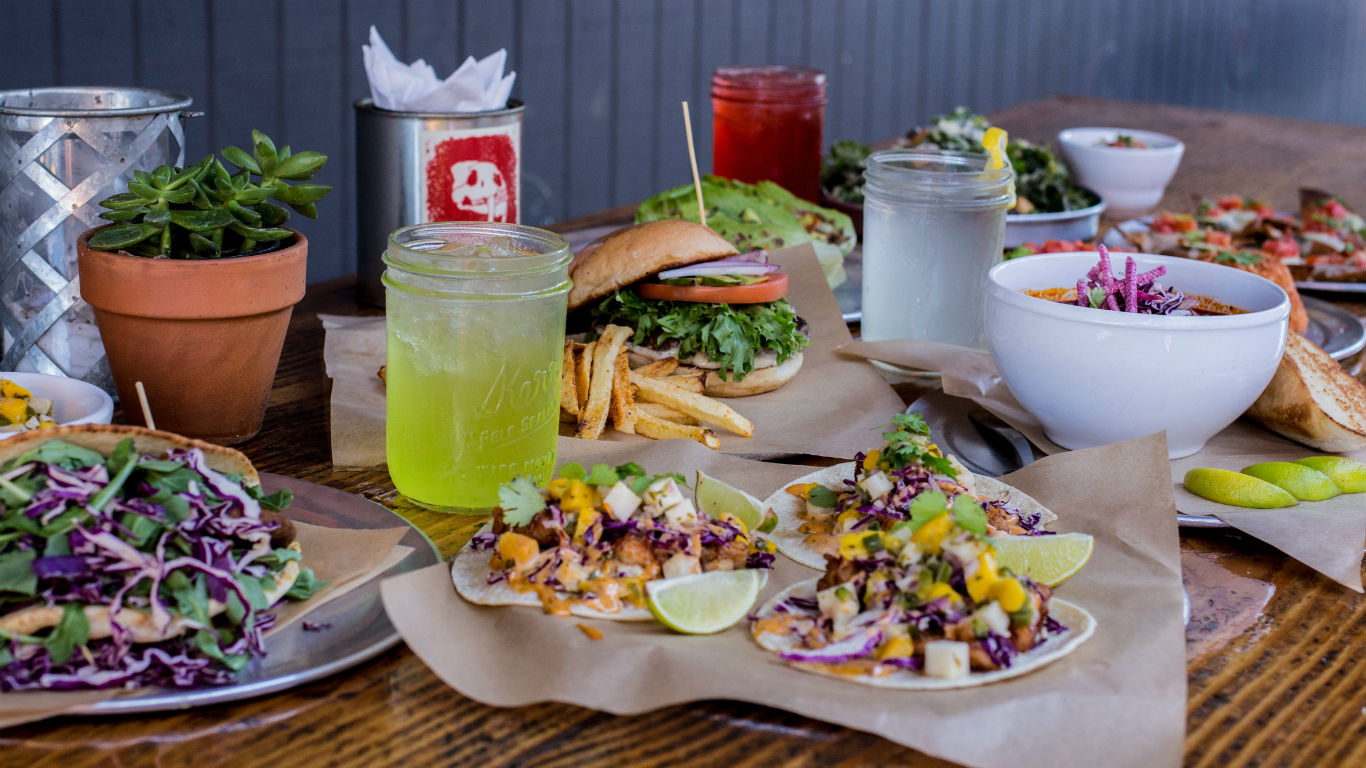
El Paso, Texas
No less an authority than Gustavo Arellano, author of “Taco USA: How Mexican Food Conquered America,” once called El Paso “the most underrated Mexican food city in the United States.” He praised both Sabertooth Food Co. and the old-line Chico’s Tacos. Other good choices might include Andale Mexican Restaurant & Cantina, Carnitas Querétaro, L & J Café, and the landmark H&H Car Wash and Coffee Shop.
There’s more to the local food scene than border and south-of-the-border fare, however. Other popular choices include Tabla for tapas (or as the restaurant puts it “small & mid-sized plates + Europen fare”), Salma Farah’s for Lebanese dishes, the upscale American bistro Café Central, and Zino’s Greek & Mediterranean Cuisine. There is also, believe it or not, a winery in El Paso, Zin Valle Vineyards — and several more just across the border in New Mexico.

Greenville, South Carolina
This city, about 80 miles northwest of Columbia, is home to South Carolina’s hottest craft beer scene, with almost 20 craft breweries and a number of alehouses and tap rooms — at least some of them offering food as well as suds.
Diners also appreciate such local favorites Sidewall Pizza, S.B.H. BBQ, The Anchorage, Sully’s Steamers (where the steamers aren’t clams but steamed bagel sandwiches), Aryana Afghan Cuisine, and Willy Taco, among many other places. Gather GVL is an innovative food hall, built partially out of old shipping containers, and more than 75 farmers, craftspeople, and artisanal food producers fill two blocks of downtown Greenville for the Saturday farmers market from early May to late October.
Healdsburg, California
This Sonoma County wine town, northwest of Santa Rosa and transected by Highway 101, is surrounded by some of California’s (and thus the world’s) best vineyards and wineries. While neighboring Napa Valley gets more attention for both its wines and its restaurants — among them the Michelin three-stars The French Laundry and The Restaurant at Meadowood — this pleasant community offers plenty of great eating, too.
It has a three-star of its own, for starters: the highly refined Single Thread, which is combined with an inn and a working farm. On an unstarred but nonetheless high level, there are also such gastronomic attractions as Bravas, a contemporary-style tapas restaurant; Campo Fina for wood-fired pizzas and Italian antipasto; Barndiva for hearty American fare in a barn that also houses a wine bar and an art gallery; El Farolito for Mexican food; Chalkboard for creative small plates; and celebrity chef Charlie Palmer’s Dry Creek Kitchen.
[in-text-ad-2]
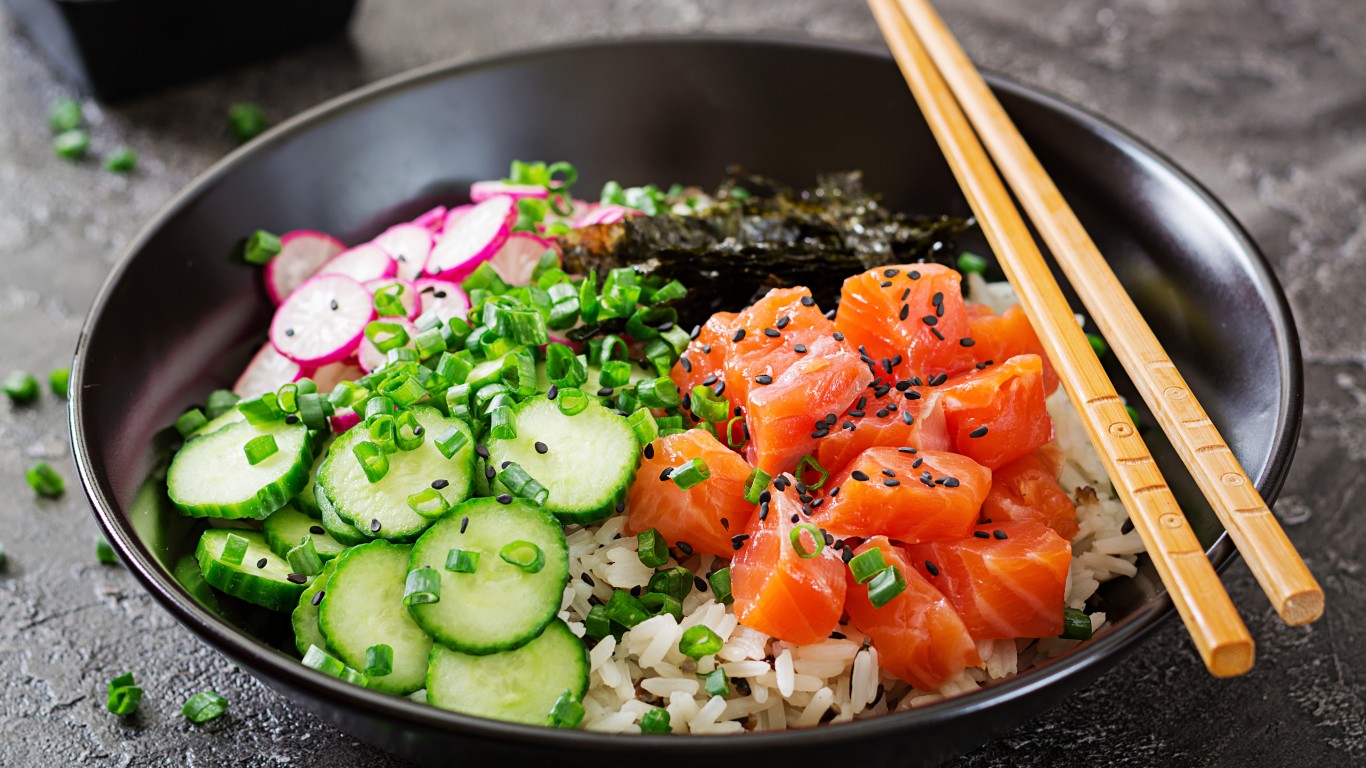
Honolulu, Hawaii
The Hawaiian capital used to be much better known for its sunshine, beaches, and laid-back lifestyle than for its good food. That might be partly because tourists didn’t typically frequent such modest but satisfying only-in-Hawaii establishments as Ethel’s Grill, Gina’s B-B-Q, or one of the nine Honolulu locations of Zippy’s. There’s so much more than that, though, in this island city.
There are Hawaiian specialties at Helena’s Hawaiian Food, the modern-style Mud Hen Water, or (about a dozen miles north of Honolulu) Waiahole Poi Factory; authentic versions of trendy poke at Maguro Bros or Ono Seafood. There are also several Japanese restaurants both low-key (like bento box specialist Mitsu-Ken) and super-high-end (ike Sushi Sho with its $300 omakase menu); Hawaiian-accented fine dining places like Senia (run by two Per Se alumni), the classic Alan Wong’s Honolulu, and Roy Yamaguchi’s Hawaii Kai — the original that spawned Yamaguchi’s nationwide chain.
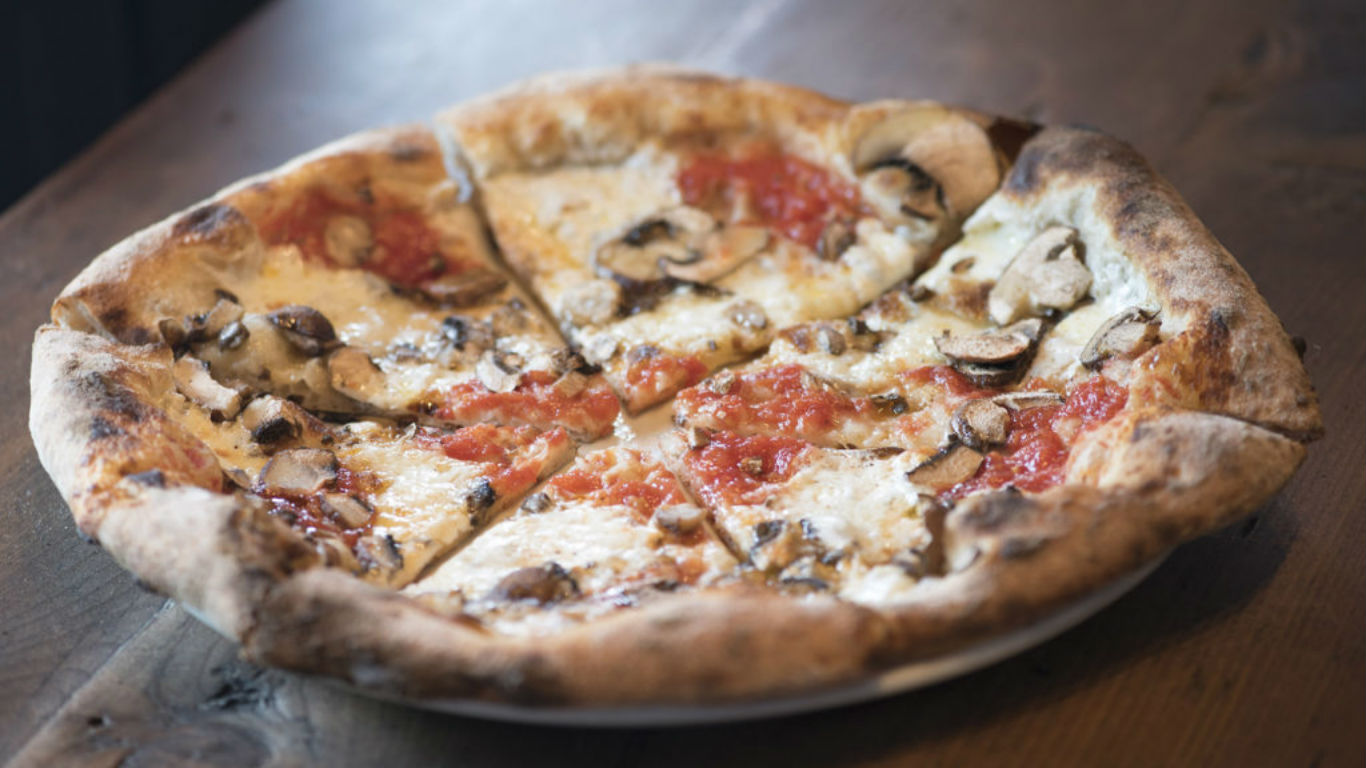
Jersey City, New Jersey
Reviewing the Jersey City pizzeria Razza in The New York Times, critic Pete Wells said that this Garden State establishment served “the best pizza in New York.” Italian is big in general in this community just across the Hudson River from Manhattan. Local favorites include Renato’s, Pasta Dal Cuore, Buon Appetito, and Roman Nose.
Many other cuisines are well-represented here too, though. Consider Chef Tan or Grand Sichuan for Chinese; Órale! Mexican Kitchen or Taquería Viva Mexico Kitchen Café for Mexican; Broa for Portuguese; Madame Claude Bis for French bistro food; the Brownstone Diner & Pancake Factory (celebrated by Guy Fieri on “Diners, Drive-ins and Dives”) for more than 25 pancake variations and a full diner menu; and Battello for Italian fare with an emphasis on seafood — and a breathtaking view of the Manhattan skyline.
[in-text-ad]
Louisville, Kentucky
Nationally known chefs like Kathy Cary of Lilly’s Bistro and Edward Lee of 610 Magnolia, MilkWood, and Whiskey Dry set the culinary tone in the Kentucky Derby city — and the Brown Hotel’s Hot Brown (an open-face concoction of sliced turkey, bacon, and mornay sauce) is one of the most famous sandwiches in America.
Wood-fired pizzas, country ham, and smoked salmon are among the specialties at Garage Bar. Sandwiches, wings, a gigantic pretzel, and about 20 craft beers on tap are on the menu at River City Drafthouse. It’s modern American and jazz (both live and recorded) at Decca. More casual choices include Bluegrass Burgers, Bánh Mí, and Danny Mac’s Pizza — and of course Louisville has no shortage of bars and restaurants specializing in the local spirit, Kentucky bourbon — Down One Bourbon Bar, Doc Crow’s, and Bourbons Bistro among them.
Memphis, Tennessee
Barbecue is the big draw here, from the famous dry-rub ribs at Charles Vergos’ Rendezvous to the Elvis Presley favorite Leonard’s Barbecue (founded in 1922) to the barbecue/sandwich/taco restaurant Elwood’s Shack (not to mention Coletta’s, where you can get barbecued pork on both pizza and spaghetti).
There’s plenty more for food-lovers in this Mississippi Delta city, though. The April-to-October Memphis Farmers Market offers the region’s best produce and artisanal foods from more than 40 vendors, including a generous side helping of food trucks. McEwen’s offers upscale Southern-accented dishes; Restaurant Iris has a New Orleans flavor; Andrew Michael Italian Kitchen was the first of six acclaimed Memphis places opened by chef-restaurateurs Andy Ticer and Michael Hudman.

New Haven, Connecticut
One food alone would win this Connecticut college town (the college is Yale University) a place on this list: pizza. The charred-and-chewy-crust brick-oven pizzas turned out by Frank Pepe Pizzeria Napoletana, Sally’s Apizza, Modern Apizza, and other practitioners in and around the city are virtually the platonic ideals of the genre (Pepe’s version has been named the best pizza in America).
But there’s plenty more here, too. Miya’s bills itself “the first sustainable sushi restaurant on earth” and specializes in using foraged vegetables and invasive species of both plants and fish; it even serves sushi made with cheese. Then there’s homemade pasta at L’Orcio, farm-to-table modern American at Heirloom, Middle Eastern at Mamoun’s Falafel, casual Chinese at Junzi’s, Ethiopian at Lalibela, Indian at Zaroka Bar & Restaurant, and all kinds of good things when the purveyors line up daily on Long Wharf’s Food Truck Paradise.
[in-text-ad-2]
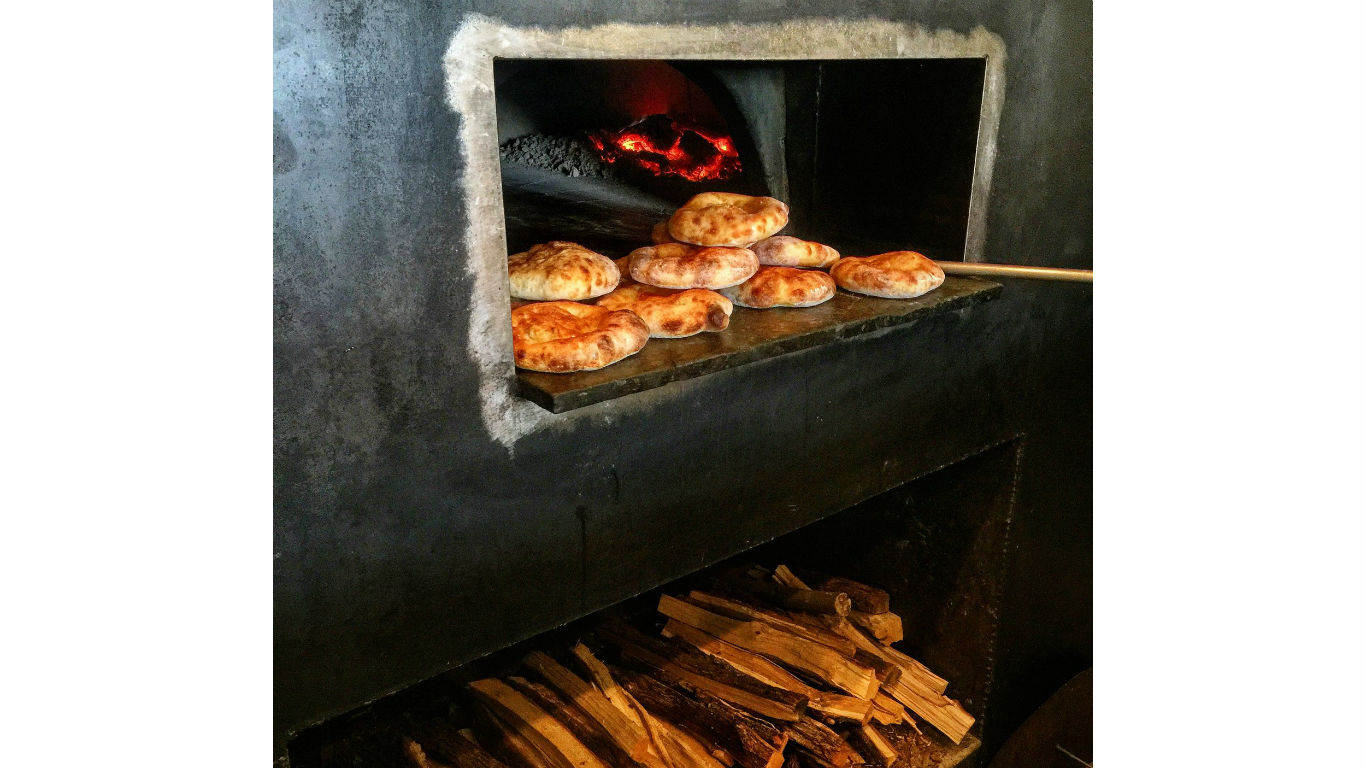
Phoenix, Arizona
“When did Phoenix become a great American food city?” asked Eater rhetorically earlier this year. Neighboring Scottsdale seems to get most of the attention, but there’s an authenticity and variety to the Phoenix food scene that makes it worth any food-lover’s visit. The big name here has long been Chris Bianco, whose Pizzeria Bianco has often been singled out as America’s best.
Mexican food is big here, of course, at places like Gallo Blanco, Tacos Chiwas, Machete Azteca, Tacos Chiwas, Hola Cabrito, Barrio Café, and many more — not to mention Lupita’s for Sonora-style hot dogs, wrapped in bacon and topped with beans, mayo, and melted cheese. Tribute is paid to Native American culinary traditions at Fry Bread House and the upscale Kai; FnB turns out international dishes using seasonal local ingredients; Alzohour Market is a tiny Moroccan restaurant; Binkley’s serves a long, leisurely tasting menu (at $200 per person — $350 with beverage pairings) — and that’s just the beginning.
Pittsburgh, Pennsylvania
The Steel City’s Smallman Galley is a unique sort-of food hall with a rotating cast of local chefs working out of four distinct micro-kitchens. The related Federal Galley, which also has four kitchens, functions as both an eating place and an incubator for chefs who want to run their own restaurants. Add the new two-story Pennsylvania Market food hall and you have an idea of why this one-time industrial capital is such an exciting place to eat — even without considering its many good restaurants.
Those, however, include the not-to-be-missed Butcher and the Rye, with its creative versions of American country fare and its extensive stock of whiskey; Poulet Bleu, serving traditional French food; the convincingly Spanish tapas bar Morcilla; and the all-American gastropub and biergarten The Commoner.
[in-text-ad]
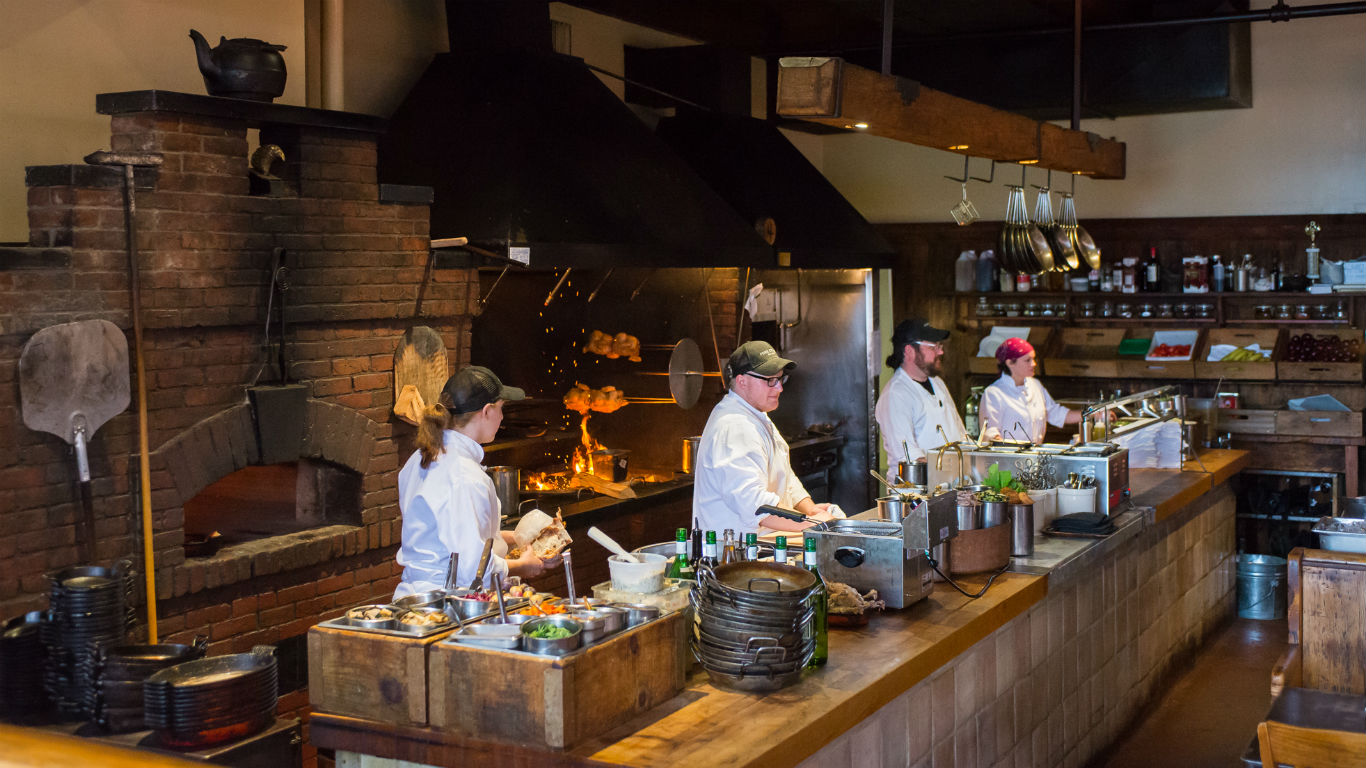
Portland, Maine
Though Portland, Oregon, gets most of the attention from food-lovers, its East Coast counterpart offers plenty to attract hungry travelers. Local celebrity chef Sam Hayward has been serving farm-, forest-, and sea-to-table cuisine for at least 30 years at his Fore Street Restaurant, and his Scales Restaurant and Street & Company are well-loved parts of the local dining community. Eventide Oyster Co. serves impeccable shellfish (and redefines the lobster roll), while Browne Trading Company is a top retail (and mail-order) source for caviar and fresh seafood from near and far. And what gourmand could resist an eatery called Duckfat?

Richmond, Virginia
The Virginia capital has been called “America’s next great restaurant-obsessed town” for several reasons: the regionally and seasonally focused bistro The Roosevelt; the upscale Lemaire in the city’s landmark Jefferson Hotel; and the Virginia-focused farm- and sea-to-table restaurant Shagbark, run by Lemaire’s former longtime chef, for starters. Then there’s the lively bar-and-grill-like Heritage; two branches of the superlative Sichuan restaurant chain Peter Chang’s; the avant-garde Longoven; and Sub Rosa, which Bon Appétit called “one of the best bakeries in America.” And no local restaurant has more personality than the love-it-or-hate-it Mamma Zu, known for its excellent old-school Italian food and its brusque service.
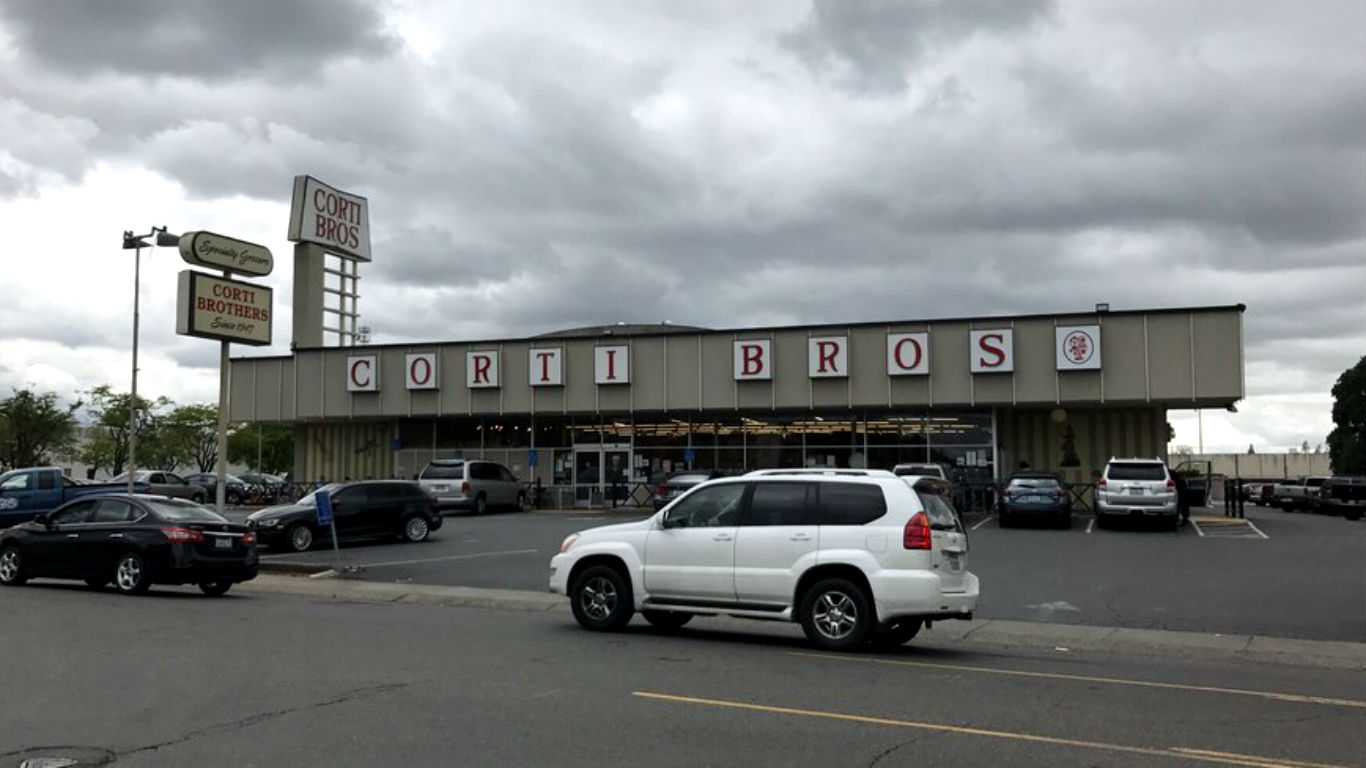
Sacramento, California
Thrillist called the Golden State’s capital “the overlooked California city that’s about to blow up as a food destination.” Why? According to Thrillist’s Matt Meltzer, it’s because “It’s the hub of America’s most abundant agricultural region, has access to more ingredients than any other city, and for a number of reasons, is finally attracting talent and investment to match its gardens.” Food-lovers all over America know Corti Bros. market, famed for one of the most eclectic selections of food and wine (and one of the most knowledgeable food and wine experts) in America.
Whether the local restaurants are Italian (Biba, Obo’), Mexican (Centro, El Novillero), Chinese (Frank Fat’s, Yue Huang), or, well, local (Localis, Magpie Café) — or anything else — the food they serve is likely to be same-day fresh. As Meltzer added, “While the big joke about ‘farm-to-table’ restaurants in bigger destinations is that they all have a Sysco truck parked out front, in Sacramento, they mean it quite literally.”
[in-text-ad-2]
San Diego, California
The iconic dish in San Diego is the fish taco, invented just across the border in Baja California but popularized here, beginning in the early 1980s. Found all over America today, the tacos are almost impossible to avoid in their adopted home. Among the purveyors approved by locals are Wonderland Ocean Beach, Pacific Beach Fish Shop, Mariscos el Pulpo, Puesto, Casa Guadalajara, The Taco Stand, and any of the three area locations of Rubio’s, now a nationwide chain but the place that first introduced fish tacos to the U.S.
Of course, the San Diego food world encompasses much more than tacos. The accents are Italian at Il Dandy and Biga, Japanese at Sushi Ota and Menya Ultra, Korean at H Mart Market Eatery. Addison Restaurant and Juniper & Ivy are cutting-edge contemporary. Born and Raised and Cowboy Star Restaurant & Butcher Shop are the spots for steak, while The Fishery and Ironside Fish & Oyster serve impeccable seafood. There are almost 40 farmers markets in the greater San Diego area — and the Temecula wine country is only an hour’s drive north.

Santa Barbara, California
Santa Barbara County is an important commercial fishing area; it is full of family farms; and it is the site of some of California’s most acclaimed wineries — so you know you’re always going to have plenty of good things to eat and drink here.
Seafood, of course, is much honored here, at places like Blackbird, Santa Barbara Shellfish Co., and Brophy Bros. The Lark and Bouchon (no relation to the Thomas Keller restaurants of the same name) are modern American with a strong regional focus. Caruso’s and the Olio-plex (pizzeria, crudo bar, and restaurant all in one) are top-notch Italian. Other restaurants worth a visit: Joe’s Café (all-American), Metropulos Fine Foods Merchant (Greek), Bibi Ji (Indian), Sama Sama Kitchen (Indonesian), and of course a whole array of Mexican places — among them the late Julia Child’s favorite, La Super-Rica.
[in-text-ad]
Santa Fe, New Mexico
This picturesque New Mexican city is ground zero for Southwestern cuisine, both traditional and contemporary. Essential stops on a local food tour include Santacafé, The Shed, Tia Sophia’s, Pink Adobe, and Coyote Café. Though still taking advantage of the great produce from farms in the area, other restaurants — for instance, Arroyo Vino, Geronimo, and Dr. Field Goods Kitchen — cook less regionally focused food, and Santa Fe Bite is a must for its famous green chili cheeseburger.
The city’s farmers market — open Saturdays all year long and Tuesdays and Wednesdays seasonally — was named as one of the country’s 10 best by Sunset Magazine. The market serves as many as 150 regional farmers and producers.
Savannah, Georgia
Chef Mashama Bailey’s Savannah restaurant, The Grey (in a repurposed Greyhound bus station), has been one of the most talked-about establishments in the country since it opened four years ago (Eater called it “stunning” and named in 2017 Restaurant of the Year). The Grey is just the start of what makes this genteel seaside Southern city a food capital. As Time Out put it, “Clearly no longer content to settle for culinary stereotypes, the Hostess City of the South has officially embraced fresh takes on local comforts.”
Leading the effort, in addition to Bailey’s place, are such restaurants at Atlantic, a casual but serious neighborhood eatery with a great wine list; Cotton & Rye, with its Southern fare and homemade breads and charcuterie; the seafood specialist The Wyld; award-winning Wiley’s Championship B-B-Q; and a Savannah outpost of the acclaimed Husk.
Stonington, Connecticut
Abutting the Rhode Island border, Stonington — part of which is Stonington Borough, the oldest village in Connecticut — encompasses the tourist town of Mystic as well. Mystic is home to Oyster Club, which has been hailed as the state’s best restaurant, and to its spinoffs, Engine Room (a “beer, burgers & bourbon” pub) and the craft butcher shop and casual eatery Grass & Bone. There’s also the celebrated Mystic Pizza (perhaps a better movie than pizzeria), the friendly wine bar and bistro M/Bar, a branch of Rhode Island’s Sift Bake Shop (famed for its fresh-baked breads and breakfast pastries), and more.
In Stonington itself, the 40-year-old Noah’s elevates the neighborhood restaurant genre with its home-baked bread, craft beer selection, and extensive menus. Food shoppers buy famed Stonington scallops and other seafood on the honor system from Stonington Seafood Harvesters; there’s an extensive dockside farmers market in summer; and an essential stop is the 1765-vintage Stone Acres Farm, under the same ownership as Oyster Club, with a seasonal farmstand, cooking classes, and a CSA (community-supported agriculture) program.
[in-text-ad-2]
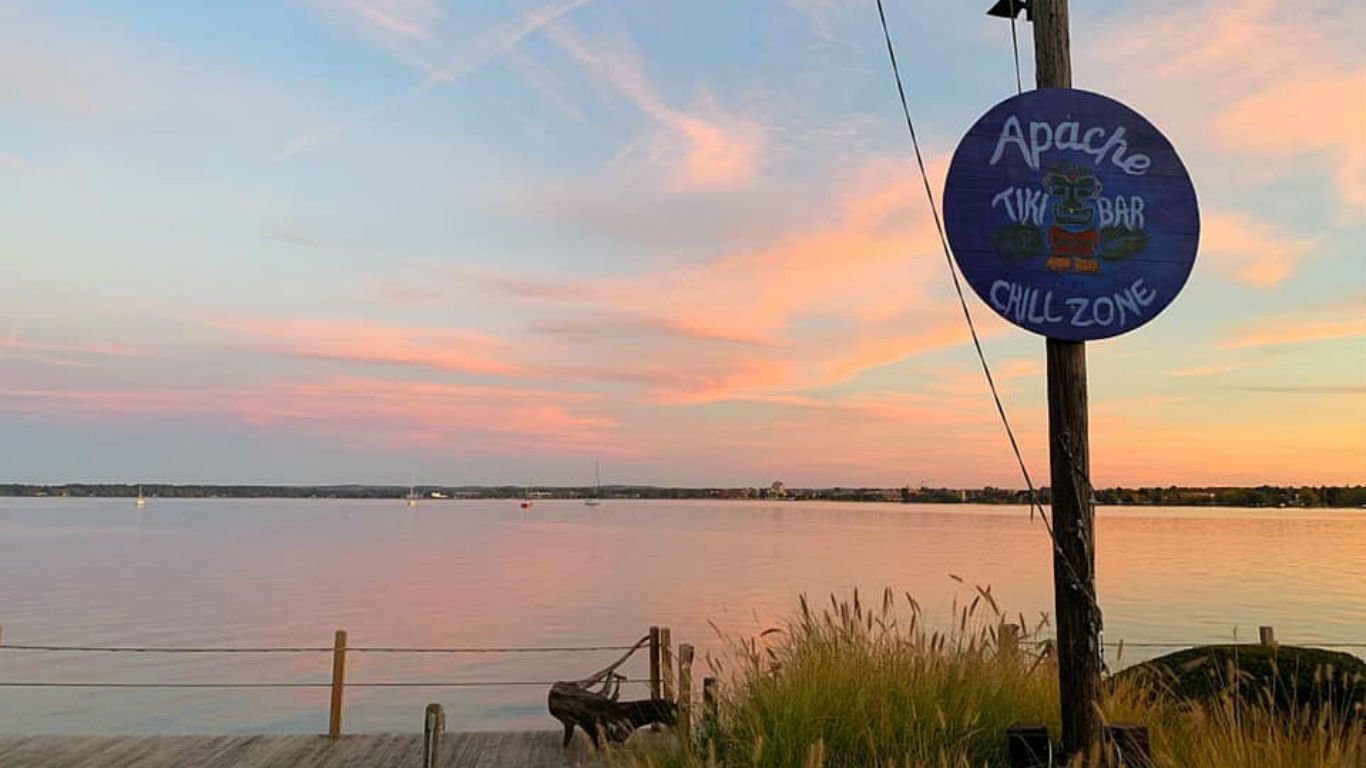
Traverse City, Michigan
In naming it one of a dozen “underrated destinations for foodies,” BuzzFeed described this northern Michigan municipality as a place “For the food and wine enthusiast who loves a small-town feel.” This is cherry country par excellence and also a major center for the state’s thriving wine industry and for an ever-growing number of craft distilleries.
The dining choices are many and varied. Trattoria Stella is top-flight Italian and its more casual sibling, The Franklin, serves internationally inspired comfort food. Georgina’s is a taqueria with an Asian accent, while Gaijin offers a Midwestern take on a Japanese bar food. Apache Trout is known for its steaks and seafood but above all for its stunning views of Grand Traverse Bay. The Cooks’ House is considered one of the state’s best restaurants for its eclectic modern American fare. And Moomers and Bardon’s Wonder Freeze get high marks from ice cream-lovers.
Credit card companies are at war. The biggest issuers are handing out free rewards and benefits to win the best customers.
It’s possible to find cards paying unlimited 1.5%, 2%, and even more today. That’s free money for qualified borrowers, and the type of thing that would be crazy to pass up. Those rewards can add up to thousands of dollars every year in free money, and include other benefits as well.
We’ve assembled some of the best credit cards for users today. Don’t miss these offers because they won’t be this good forever.
Flywheel Publishing has partnered with CardRatings for our coverage of credit card products. Flywheel Publishing and CardRatings may receive a commission from card issuers.
Thank you for reading! Have some feedback for us?
Contact the 24/7 Wall St. editorial team.